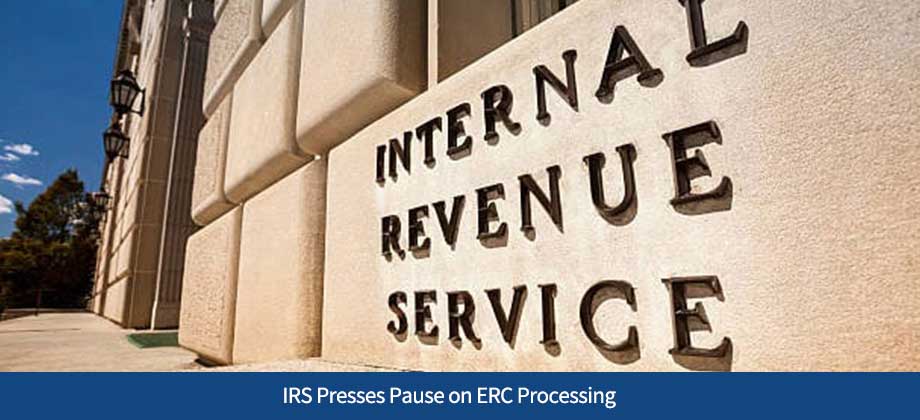IRS Presses Pause on ERC Processing

The Employee Retention Credit (ERC) was introduced in March 2020 as an incentive for small business owners to keep their employees on the payroll throughout 2020, during the height of the COVID-19 pandemic when many businesses were forced to shutter their operations and unemployment was skyrocketing. This refundable employment tax credit aimed to assist businesses with the cost of keeping their people employed. While some marketing tactics around the ERC made it seem like any business could apply for the credit, that was simply not true—there are a slew of requirements businesses must meet in order to be eligible (take a look at the IRS checklist for guidance). But as with any policy that seems to be handing out free money, there were bad actors. Which brings us to the fall of 2023, when the IRS has decided to press pause on processing new ERC claims. Why? There are too many fraudulent, questionable claims being made, to the tune of 3.6 million. Let’s dive a little deeper into what this means for small businesses who have legitimately filed a claim.
The IRS is seeing signs that there are people taking advantage of the ERC, which is what ultimately drove the decision suspend the processing of claims in an effort to protect the integrity of the program itself. One of the “bad actors” to blame is what’s called an ERC “mill.” Those behind these scams have a slew of ways they attempt to sway businesses into applying for the ERC, including aggressive marketing tactics (via social media, television, phone calls, and text messages) or false letters/direct mail from the non-existent “Department of Employee Retention Credit.” Additionally, the IRS website notes that “Third-party promoters of the ERC often don’t accurately explain eligibility requirements or how the credit is computed, and they do not share their workpapers with the businesses claiming the credit. They may make broad arguments suggesting that all employers are eligible without evaluating an employer’s individual circumstances.” ERC mills will contact business owners, offering assistance with getting an ERC payout. They’ll charge a percentage of the total credit (north of 25 percent in some cases), and they tend to target businesses that won’t even qualify for the ERC anyway. If a business is found by the IRS to have intentionally filed false information on their claims, they could face fines or criminal charges, in addition to the hit their reputations will take as a result. That business is also responsible for paying back the credit they received.
With the influx of scams, the IRS needs to focus on auditing thousands of fraudulent claims—and pause the processing of new claims until at least the end of 2023. Claims filed prior to the moratorium, which was announced on September 14, 2023, will still be processed; however, it’s important to note that processing times will be longer and payouts will come at a slower pace: “Existing ERC claims will go from a standard processing goal of 90 days to 180 days – and much longer if the claim faces further review or audit. The IRS may also seek additional documentation from the taxpayer to ensure it is a legitimate claim,” as noted in an IRS press release.
While the IRS is putting a hold on processing ERC claims, your business might still need additional cash on hand. That’s where the expert loan consultants at ARF Financial can help you weather the storm. Our staff is well-equipped to help small business owners secure the funding they need, whether it’s to help make payroll or hire additional staff for the upcoming holiday season. We understand how stressful it is to need money at the drop of a hat—so let us help you gain access to a line of credit or small business loan. We can get you funded in as little as 24 hours. Stop by today to learn more!

